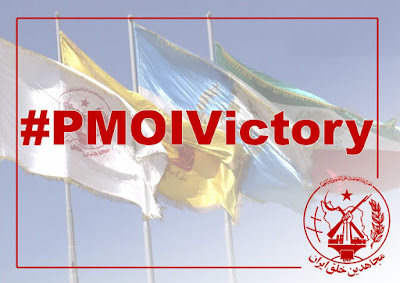 |
Iran:Successful
Completion of the Resettlement of Camp Liberty residents from Iraq to Europe
|
Showing posts with label attacks. Show all posts
Showing posts with label attacks. Show all posts
Friday, 9 September 2016
Iran:Successful Completion of the Resettlement of Camp Liberty residents from Iraq to Europe
Labels:
Albania,
attacks,
Camp Ashraf,
Camp Liberty,
dictatorship,
Iran,
Iranian,
Iraq,
Justice,
MEK,
missile,
Mojahedin,
PMOI,
regime’s,
residents
Monday, 18 April 2016
IRAN:How hypocritical the trip to Tehran is from the perspective of a dissident
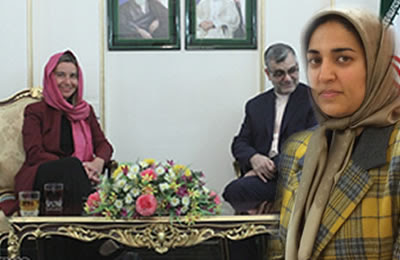 |
How hypocritical the
trip to Tehran is from the perspective of a dissident
|
The parade of Western
leaders, with their shared weaknesses.
The young Zanjani
speaks: “The mullahs haven’t changed”
Il Foglio - April 14,
2016
By Cynthia Martens
Paris. Elham Zanjani
has never been to Iran. Her parents left their home country in the 70s, and she
was born in Montreal in 1978 and raised in Toronto. Though Zanjani speaks
fondly of Canada, as a young girl she was troubled by the knowledge that far
away, cousins whom she had never met were living a totally different sort of
life.
“You
always have in the back of your mind,” she says in an interview with Il Foglio.
“How is it possible that I could grow up in a place where I could do sports, I
could swim, I could think freely, go to the mall, listen to music, eat what I
want and start building the future that I want – but my cousins, the same age
as I was, didn’t have the same rights,” she says, noting that the girls had to
wear full black chadors. Contact with loved ones in Iran was limited, due to
the regime’s aggressive monitoring of phone calls.
The scar of Camp Ashraf
Zanjani’s concern for
her relatives eventually blossomed into a desire to work with the Iranian
resistance. As a college student in Canada, she was interested in
physiotherapy, but instead of finishing her studies, left everything for Camp
Ashraf, a city in Iraq near the border with Iran that was home to many
political refugees and former prisoners of the Iranian regime. Though she
initially expected her stay to be brief, Zanjani stayed for well over a decade,
working at the local hospital and putting her language skills – in addition to
English, she speaks French, Farsi and a bit of Arabic – to use as an
interpreter.
“I
got to improve my Farsi, and got to really understand my background much more,”
she recalls.
A relatively peaceful
life in Ashraf took a turn for the worse after U.S. troops pulled out of Iraq,
and residents of the camp experienced several attacks from Iraqi forces guided
by a prime minister, al-Maliki, who was sympathetic to the Iranian regime.
Zanjani was directly hit by a grenade. Getting proper care for her extensive
arm and leg injuries was complicated, and Zanjani eventually returned to
Canada, where she recovered.
Labels:
al-Maliki,
attacks,
Camp Ashraf,
Elham Zanjani,
forces guided,
Iran,
Iraq,
leaders,
mullahs,
Paris,
peaceful,
Prime Minister,
Tehran,
U.S.,
young
Thursday, 31 March 2016
Brussels Attacks: Iranian State Television claims Europeans ‘only have themselves to blame’ for terror attacks
 |
Iran State TV - 22
March 2016 “ The boomerang return of Daesh”
|
A Brussels-based NGO
has condemned Iran’s regime for broadcasting “sarcastic” reports on its state
television about the deadly terrorist attacks in the Belgian capital on 22
March.
The Alliance to Renew
Cooperation among Humankind (ARCHumankind) said in statement that it remains
“outraged that Iranian State television would make a mockery of the High
Representative Vice President Federica Mogherini on the basis of her human
reaction to those who had lost their lives and were targeted by ISIL acclaimed
terrorists.”
“The
channel continued their ridicule by insinuating that Europe ‘only had
themselves to blame’ and that perhaps now Europe might ‘feel close-up the fear
and horror that the Syrian people have endured over the past 5 years, created
by the interferences of their (European) politicians’,” the March 30 statement
by ARCHumankind added.
“These acts committed by Jihadist militants
are acts of heinous violence and the Iranian State television implying that
‘European decision-makers are supporting terrorist acts’ can only be seen as an
incitement for the continuation of the Jihadi aggression against Europe.”
 |
| فروردین -تلویزیون رژیم |
“Whereas the European
institutions have unduly decided to forget the well-documented co-operation of
the Iranian authorities with the creation of an Al-Qaeda branch in Iraq in 2001
and the Syrian regime logistical support to this organisation from 2003 up to
2011 – in the vain hope this memory erasing exercise would make the theocracy
to behave better – the insulting attitude of the Iranian authorities vindicates
the point of view of all those who warned against this kind of appeasement
attitude.”
Thursday, 4 February 2016
Continued Russian bombings of civilians blamed for jeopardizing the fragile peace talks
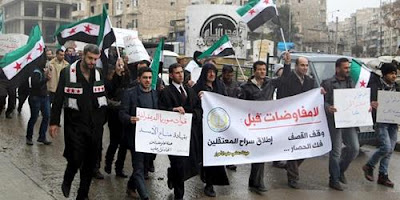 |
Residents
carry banners and opposition flags as they march during a protest in Aleppo
|
Syria’s main opposition
bloc has given warning that attacks by government forces in Aleppo province
could stand in the way of the peace talks under way in Geneva.
The warning was sounded
by the Higher Negotiations Committee (HNC), which sent a 17-strong opposition
team, including three rebel leaders, to the Swiss city for talks.
Salim al-Muslet, HNC
spokesman, said the opposition was waiting for reaction to the developments in
Aleppo and other provinces.
'Since
last night, big massacres have taken place in Syria and nobody is doing or
saying anything.
'We do not know if the
international community is completely blind or they do not want to do anything.
We are here to know if they are keen to do anything - then we are waiting for
them.'
Labels:
Aleppo,
attacks,
bombings,
children sieges,
Geneva,
government,
leaders,
opposition,
peace,
Province,
Russian,
starving,
Syria’s,
warning
Thursday, 17 December 2015
Iran, the Islamic State, and the Perversion of Islam
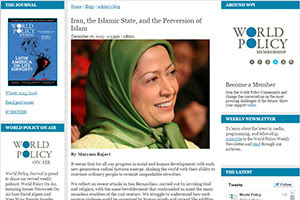 |
| Maryam Rajavi |
It seems
that for all our progress in social and human development, with each new
generation radical factions emerge, shaking the world with their ability to
convince ordinary people to commit unspeakable atrocities.
We reflect
on recent attacks in San Bernardino, carried out by invoking God and religion,
with the same bewilderment that confounded us amid the many senseless cruelties
of the 21st century. We struggle to understand how such wanton violence could
be conceived by human minds and spread like wildfire. And, of course, we set
ourselves to right it, asking how we can combat this most current version of
extremism and prevent new forms from plaguing the world.
The breed
of extremism that we face today is a lethal cocktail of medieval barbarism and
modern-day fascism. It is a worldview that shuns political tolerance, promotes
misogyny, and, of course, glorifies violence. This specific brand pursues the
implementation of Sharia and its draconian punishments. It has never had any
connections to Islam, and there is clearly no place in the modern world for
such a worldview.
However,
it is a worldview with contemporary precedent. Ever since Ruhollah Khomeini
came to power in 1979, Tehran championed itself as a successful model, which
fundamentalists could follow in order to gain stature, power, and sovereign
legitimacy. This presents a tantalizing message to Sunni extremists like the
Islamic State– why can they not create their own “Islamic” State when Shiite
fundamentalists have already done so?
While the
conceptual origins of this extremist ideology took shape in the early years of
Islam, it only turned into a formidable global force when fundamentalism
gripped Iran in the aftermath of the 1979 revolution.
The regime
that replaced the Shah—who was also detestable and undemocratic—began exporting
Islamic fundamentalism on an unprecedented scale almost overnight. High-profile
hostage-takings, bombings, suicide attacks, and assassinations became the norm
as the mullahs in Tehran began building their own version of a theocratic state.
In these
early stages, Shiite terrorist factions, including militias in Iraq, Hezbollah
in Lebanon, the Houthis in Yemen, and others were directly formed by the
Iranian regime. Without such state sponsorship from Tehran, their clout and
influence would have quickly evaporated and they would have vanished. The
vicious ideology and proliferative model grew increasingly lethal as its
proponents gained access to veritable troves of military, diplomatic,
political, and propaganda resources within the sovereign state borders of Iran.
So began
the first modern-day “caliphate”—years before al-Qaida’s first attack burned in
Yemen, and a full three decades prior to the rise of the Islamic State.
Many
assume that Sunni fundamentalism is a unique phenomenon, entirely separate from
the dogmas espoused by the Shiite mullahs in Tehran, but the differences are
ancillary. In fact, Sunni fundamentalists have found tremendous strength under
the political and spiritual umbrella of the Iranian theocracy. Both share the
same ideological building blocks: the establishment of a religious state, which
implements Sharia by force.
There is
considerable evidence that the regime in Tehran has armed and financed Sunni
extremists at various times and locations. Not only is Iran a long-standing
sponsor of Hamas, but also as U.S. Secretary of State John Kerry said recently,
“ISIS was created by Assad releasing 1,500 prisoners from jail, and Maliki
releasing 1,000 people in Iraq who were put together as a force of terror.”
Tehran is the known puppet-master of both.
In recent
years, the massacre of hundreds of thousands of Sunnis in Iraq and Syria at the
hands of the Iranian regime and its proxies has provided a wellspring of
sociopolitical sustenance for the Islamic State. Iran is propping this
extremist hydra up on all sides, and finding new and creative ways to
reinvigorate the beast as our security and intelligence missions stride in its
wake. If Iran is one of the linchpins that legitimize the global Islamic
extremist threat, what is to be done?
History
tells us that nothing is more dangerous for fundamentalism and extremism than
democratic and moderate ideals. This has been made clear in Iran, where the
regime’s suppressive tactics find their chief targets are the moderate Muslim
factions, including the Mujahedin-e Khalq (MEK).
To meet
with true success, the current military campaigns and intelligence operations
in the region must be complemented by the promotion of an interpretation of
genuine Islam that is both democratic and tolerant. Only through a nuanced but
unambiguously affirmative strategy that provides lasting moral and physical
support to the people of Iran and the region in their quest for freedom and
moderate leadership will we escape the echoes of history’s darkest narratives.
Maryam
Rajavi is the president-elect of the National Council of Resistance of Iran,
which seeks the establishment of a democratic, secular, and non-nuclear Iran.
Monday, 14 December 2015
The road to defeating ISIS runs through epicenter of Islamic extremism in Iran
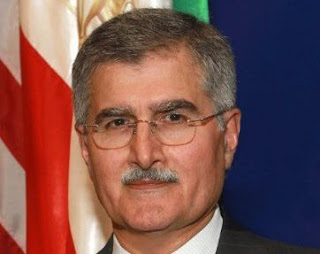 |
| Ali-Safavi |
By
Ali Safavi
Published
December 14, 2015
FoxNews.com
The
heinous terrorist attacks in San Bernardino 12 days ago and in Paris last month
were clear reminders of the growing threat of Islamic extremism. This vicious
ideology continues to take new physical forms - once Al Qaeda, now ISIS. Their
goal is to create an Islamic "state" capable of enforcing Sharia law
by force and unwinding humanity's democratic achievements.
While
the Sunni variant of fundamentalism desperately seeks to achieve this
objective, the Shiite version in Tehran is well on its way. It should be
confronted, not engaged.
Hotspots
like Syria, Iraq, and Yemen have become a breeding ground for ISIS. In all of
them, Tehran's fundamentalist regime - the world's largest state sponsor terror
plays a key role in the mayhem.
The
Iranian regime’s regional agenda is, in the words of its Supreme Leader,
“diametrically opposed” to that of the U.S.
In
fact, after the deadly Paris attacks, Tehran's officials and media quickly
blamed France itself, with some suggesting that the French "deserved"
these attacks because Paris supported ISIS against Syrian dictator Bashar Assad
- a key Iranian ally.
Tehran
is now trying to push a new narrative. For it, ISIS is a blessing in disguise
because it conveniently justifies its destructive involvement in Syria and other
countries. Now, the mullahs are attempting to convince western governments to
join them in backing Assad. That is a dangerous proposition.
Yet
in the aftermath of the nuclear deal, some in the West are optimistic about the
theocracy being more open to political reforms. But the facts and the evidence
do not support this perception. Instead of changing course in the region,
Tehran is even more adamant that others should follow its destructive policies.
And
if improved human rights are a sign of moderation, the situation in Iran has in
fact worsened significantly under the supposedly “moderate” president Hassan
Rouhani.
A
new United Nations report says in the first nine months of this year, more than
690 people were executed in Iran, “likely putting the execution rate during the
first half of 2015 at its highest in some 25 years.” This month, Tehran was
censured for the 62nd time by the United Nations.
The
U.N.’s special rapporteur Ahmed Shaheed made a chilling reminder that juveniles
continue to be executed by the regime, and Amnesty International has called
Iran one of the last remaining executioners of children in the world.
Women
continue to be treated as second-class citizens. Last year, dozens of women had
acid splashed on their faces because they were seen as violating the regime’s
strict veiling laws.
Young
girls are prevented from attending certain university courses like business
management and English translation. And, the parliament (Majlis), under
Rouhani, has passed a series of laws further marginalizing and disenfranchising
half of the population.
Journalists,
bloggers and opposition activists are routinely arrested by the regime. In one
high-profile incident, a young blogger, Sattar Beheshti, was killed under
torture.
According
to the U.N. report, the regime continues to use a variety of torture methods,
including the surgical removal of eyes and hand amputations - much like ISIS
does in its "caliphate."
So
much for moderation!
The
Iranian regime is controlled by the Supreme Leader Ali Khamenei -- an
equivalent of the "caliph" of the "caliphate." He makes all
the final decisions that determine the strategic direction of the
"Islamic" state.
A
few days after the nuclear deal was announced, Khamenei warned, “We will never
stop supporting our friends in the region and the people of Palestine, Yemen,
Syria, Iraq, Bahrain and Lebanon. Even after this deal our policy towards the
arrogant U.S. will not change.”
Iran's
medieval regime cannot be reformed because any sign of moderation would provide
an opening for the emergence of popular demands, which would mature into
protests for democracy.
Many
leading observers agree that the real alternative to fundamentalism lies within
the larger Iranian society, and not within the shrinking confines of a dying
theocracy. Just as the curtain of communism finally fell in Eastern Europe by
that region’s restive population, so can the curtain of fundamentalism in Iran.
Unless
and until the U.S. government looks to solve the Iranian problem by falling
back on the problem itself – the regime in Tehran – it will fail to instigate
genuine change. It should start by challenging Tehran’s involvement in Syria
and working to remove Assad from power as quickly as possible. That is the real
solution to the growing threat of ISIS.
Ultimately,
the answer to Islamic fundamentalism lies in the hands of the Iranian people
and Iran’s organized opposition, which is led by a Muslim woman, Maryam Rajavi.
The removal of the epicenter of fundamentalism in Iran will ensure that the
world is free of the vile threat of extremism for good.
Ali
Safavi is a member of the Foreign Affairs Committee of the National Council of
Resistance of Iran, which seeks the establishment of a democratic, secular and
non-nuclear Iran.
Labels:
attacks,
Bashar Assad,
Democratic,
France,
French,
Fundamentalism,
human rights,
humanity's,
Iranian,
Iraq,
ISIS,
Islamic,
leader,
Paris,
regime,
regional,
San Bernardino,
Tehran's,
terrorist
Monday, 23 November 2015
Gathering at NCRI headquarters in solidarity with the people of France
 |
A number of political personalities, advocates of human rights,
elected representatives of the people of France
|
Maryam Rajavi calls on all Muslims to unite against terrorism and
extremism under the name of Islam
In a ceremony commemorating victims of terrorist attacks in Paris
and in solidarity with the people of France held on Saturday, November 21, the
Iranian Resistance’s President-elect Maryam Rajavi reiterated:
The November 13 tragedy demonstrated that there are two opposing
fronts; freedom-loving people and advocates of democracy and separation of
religion and state, tolerant and democrat Muslims versus tyrants, savages,
fanatics, ISIS, Bashar Assad and the Iranian regime.
Mrs. Rajavi said: Muslims who believe in democracy are the most
effective force which could fight and defeat the global danger of Islamic
fundamentalism.
She called on all Muslims, particularly Muslims in France, to unite
in a front against terrorism and extremism under the name of Islam.
In this solidarity event at the Iranian Resistance's headquarters
in Auvers-sur-Oise, Mrs. Rajavi rejected the idea of cooperating with Assad to
eliminate Daesh. She said: The very existence of Daesh from day one has
depended on Bashar Assad and the Iranian regime. Two parties will be seriously
hurt by Bashar Assad’s ouster, one is Daesh which would lose its breeding
grounds. The other is the Iranian regime whose regional front would crumble and
disintegrate.
Mrs. Rajavi said: On the one hand, Daesh slaughters dozens of young
people in the terrorist carnage in Paris, on the other, the Tehran regime
rejoices this anti-human crime and threaten that if France does not accept
continued rule of Bashar Assad, more attacks will be on the way.
Wednesday, 18 November 2015
Memorial for Paris attacks victims in front of the Bataclan at 3PM today
 |
| Memorial for Paris attacks victims |
Supporters
of the National Council of Resistance of Iran (NCRI) and activists of the
Iranian Resistance will take part in an elaborate event in front of the
Bataclan at 3 PM today (November 18) in memory of the victims of last Friday’s
deadly terrorist attacks in Paris.
The
scheduled event will include musical performances and singing, symbolic acts in
memory of the 129 victims, and the laying of a wreath.
On
November 16, Maryam Rajavi, President-elect of the Iranian Resistance, and
officials and supporters of the NCRI held a minute of silence in
Auvers-sur-Oise, north of the French capital, in memory of victims of the Paris
attacks.
Subscribe to:
Posts (Atom)